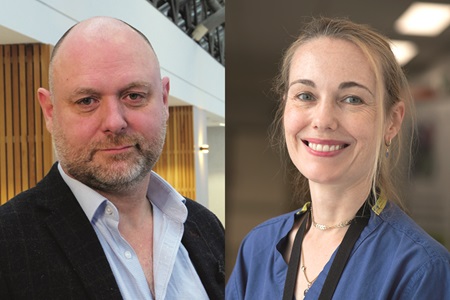
CX Executive Board members Nicholas Inston (Birmingham, United Kingdom) and Kate Steiner (Stevenage, United Kingdom) discuss some of the highlights of this year’s CX vascular access and renal interventions programmes.
One thing that both Inston and Steiner made sure to highlight was the fact that the programme this year will be heavily focused on controversies, and the fact that the issues that arise in vascular access do so on a global scale. When speaking on what she felt merited close attention, one of the first things that Steiner highlighted was the Great Debate, which will be taking place on Tuesday. The topic—endovascular arteriovenous fistulas (endoAVFs) are a failed experiment—will be hosted by Inston and moderated by Narayan Karunanithy (London, United Kingdom), and is a debate that Steiner said she is sure “will be controversial”. She also said that, whilst she is “very much against the motion”, she feels that it will “be really interesting to see if that changes at the end of the debate”.
Steiner is not alone in her belief that this will be a programme highlight, as Inston also accentuated the importance of addressing endoAVFs and their role in vascular access.
“This technology has been around for about 10 years,” Inston averred, “first in an experimental setting, but now, fully into the clinical area”. According to Inston, however, the issue arises from the fact that “we don’t really know yet where we should be using these fistulas. Should these be for everybody? Should these be for a select few? Should there be actually certain indications in certain patients? Or actually, are we not using them in a wide enough application?” This, he stated, will be the focus of the Great Debate, with input from, as Inston put it, “the experts who’ve done some of the highest volumes of these cases in the world”.
Another feature of the programme that both Steiner and Inston highlighted was the focus on drug-coated balloons (DCBs).
Whilst addressing how variations in reimbursement can lead to differences in standard of care on a global level, Steiner referred to DCBs, stating that “in the UK, these drug-coated technologies are reimbursed via the high-cost device tariff. This doesn’t happen globally, and they can therefore add a significant expense to a procedure, which is then reimbursed, and the reimbursement may not be reflected in the tariff for that procedure. So again, we see this can create differences in pathways and can lead to inequalities in care globally.” The afternoon of day one will give several opportunities to address these drug-coated technologies, with a session addressing whether or not we know which DCB to use and the ABISS trial, as well as a podium first on five-year results from the Medtronic-sponsored IN.PACT AV Access trial.
Another aspect of the programme that Inston highlighted was the fact that it is not just vascular access that will be the topic of discussion, but also renal interventions. “This session is not just about vascular access,” Inston stated. “This is also about management of the patient with renal failure. And for a lot of us who do intervention and surgery, we will be presented with patients with kidney problems, particularly in the vasculature, and this might include nutcracker syndrome, this might include renal artery stenosis, but also the treatment option of renal denervation, for resistant hypertension, is coming back into the clinical arena. We’re going to discuss all of these things and present the cutting-edge, up-to-date research on this.”
Another aspect of the programme that is vital to Inston is making sure to address “not only the complex, the new, the innovative, but also the everyday”. To do so, there are now sessions in which Inston and Steiner will be presenting cases to international experts and asking them “what would you do?”
Steiner also made sure to highlight the wider coverage of the programme: “The other sessions that we have which are going to be great,” she stated, “are the case presentations and discussions in the presentation zone that will be a really good opportunity for people to, in a smaller forum, ask the experts, and we’ve got a really good programme for that.”











